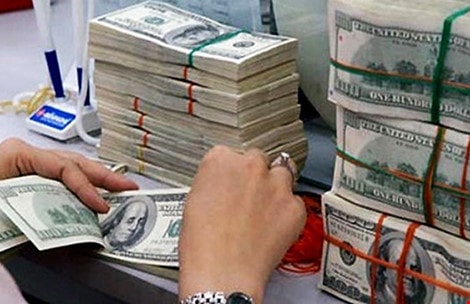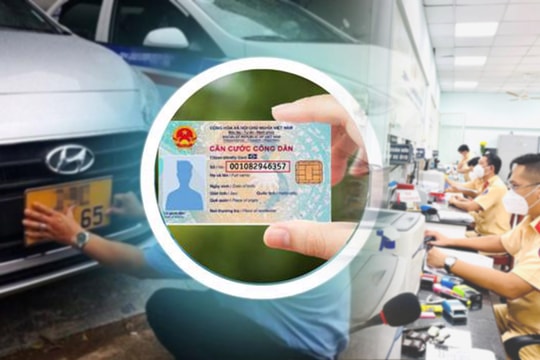Tightening foreign currency loans, export businesses face difficulties
Tightening foreign currency lending will affect businesses due to increased borrowing costs.
Circular No. 24 of the State Bank of Vietnam (SBV) stipulates that from April 1, banks are no longer allowed to lend foreign currency to meet domestic production and business needs.
This information makes many businesses and individuals worry that it will be difficult to access foreign currency credit, especially because it will increase costs because borrowing VND has higher interest rates than borrowing foreign currency.
Prohibition of borrowing foreign currency to sell for VND
Responding to the press's question about why the target group of companies with short-term capital needs in the country to produce and trade export goods was narrowed, Mr. Bui Quoc Dung, Director of the Monetary Policy Department of the State Bank of Vietnam, explained that in the past, to encourage production and business activities in a difficult economic situation, the State Bank of Vietnam allowed borrowing foreign currency and then selling it for VND to buy machinery, equipment, and raw materials for domestic production. Then, exporting goods to get foreign currency to pay off debts. This is one of the solutions to support businesses, because foreign currency loan interest rates are much lower than VND loan interest rates.
However, the economic situation has now warmed up, credit growth is good, so the State Bank has tightened foreign currency lending to these subjects. "The subjects of foreign currency loans need to be narrowed down, only serving the subjects that need foreign currency. On the other hand, stopping foreign currency lending to meet domestic capital needs will contribute to stabilizing the foreign exchange market, thereby also positively affecting credit growth in Vietnamese currency" - Mr. Dung explained.
 |
| Many businesses worry that banning foreign currency loans will push up borrowing costs. |
Speaking more about Circular 24, Mr. Nguyen Hoang Minh, Deputy Director of the State Bank of Vietnam, Ho Chi Minh City Branch, said that this is one of the solutions to combat dollarization of the economy. "The above group of subjects often borrow foreign currency to resell to banks for VND, thereby enjoying low interest rates. Borrowing and buying USD for subjects such as companies or individuals is still met according to the provisions of the law" - Mr. Minh said.
Many people agree with the State Bank's anti-dollarization policy, but this policy also causes concern for many businesses, especially export units. A representative of an export company said that when they cannot borrow foreign currency, many businesses will have to borrow VND. Meanwhile, VND interest rates are higher than USD interest rates, leading to increased borrowing costs, thereby increasing the cost of export goods and reducing the ability to compete with foreign competitors.
Will commercial banks be affected by the above circular? Banking and finance expert, Mr. Can Van Luc, assessed that the above circular will not affect banks too much because currently foreign currency credit of banks accounts for a quite small proportion, about 10% -12%. Therefore, the State Bank wants to continue to reduce this ratio to be in line with the anti-dollarization roadmap.
Share with businesses
How to facilitate export companies and harmonize the interests of enterprises with the goal of anti-dollarization? Dr. Can Van Luc suggested some solutions. Firstly, the commercial banking system needs to identify suitable subjects for foreign currency loans, and then propose that the State Bank continue to lend. At the same time, the State Bank also needs to quickly appraise the proposals of commercial banks to avoid the situation where enterprises have to wait too long and lose business opportunities.
Second, in cases that arise, for example, there are 50-50 cases, meaning that if we look at the regulations, they are suitable for the loan recipients, but if we "understand differently", it may not be clear. Commercial banks and the State Bank must sit together to unify their views as well as how to classify the loan recipients.
Meanwhile, Mr. Tran Tan Loc, Deputy General Director of EximBank, said that Circular 24 is a positive regulation to stabilize the foreign exchange market and enhance the position of the dong. "However, in order to comply with the regulations of the State Bank and still share the difficulties with businesses, we will consider lending them dong at relatively competitive and reasonable interest rates."
Dr. Nguyen Tri Hieu, a banking finance expert, “advised”: If the exchange rate fluctuation is below 3%, companies can bear it. If it exceeds 3%, banks should share it with businesses. With this method, the shorter the loan term, the less risk businesses have.
Dr. Hieu also said that the Government should have programs to support export companies, because they earn foreign currency for the country. For example, there should be a credit package with low interest rates to support export companies.
Foreign currency mobilization decreased Since the end of 2015, the State Bank of Vietnam has decided to lower the interest rate on USD deposits to 0%. From January 4, 2016, the agency has applied a flexible daily central exchange rate mechanism. This move has gradually stabilized the foreign exchange market. However, after lowering the USD mobilization interest rate to 0%, there is still a situation of hoarding foreign currency in the market. Besides, banks are also having difficulty in mobilizing foreign currency. As of March 23, foreign currency mobilization decreased by 2.3% compared to the beginning of 2016. According to Circular 24, a number of groups of subjects are allowed to continue borrowing foreign currency, including: Groups making overseas payments for imported goods and services when borrowers have enough foreign currency from production and business revenue to repay loans; groups lending for direct overseas investment in important national projects and works; groups borrowing short-term loans for key companies importing petroleum. |
Legal
| RELATED NEWS |
|---|


